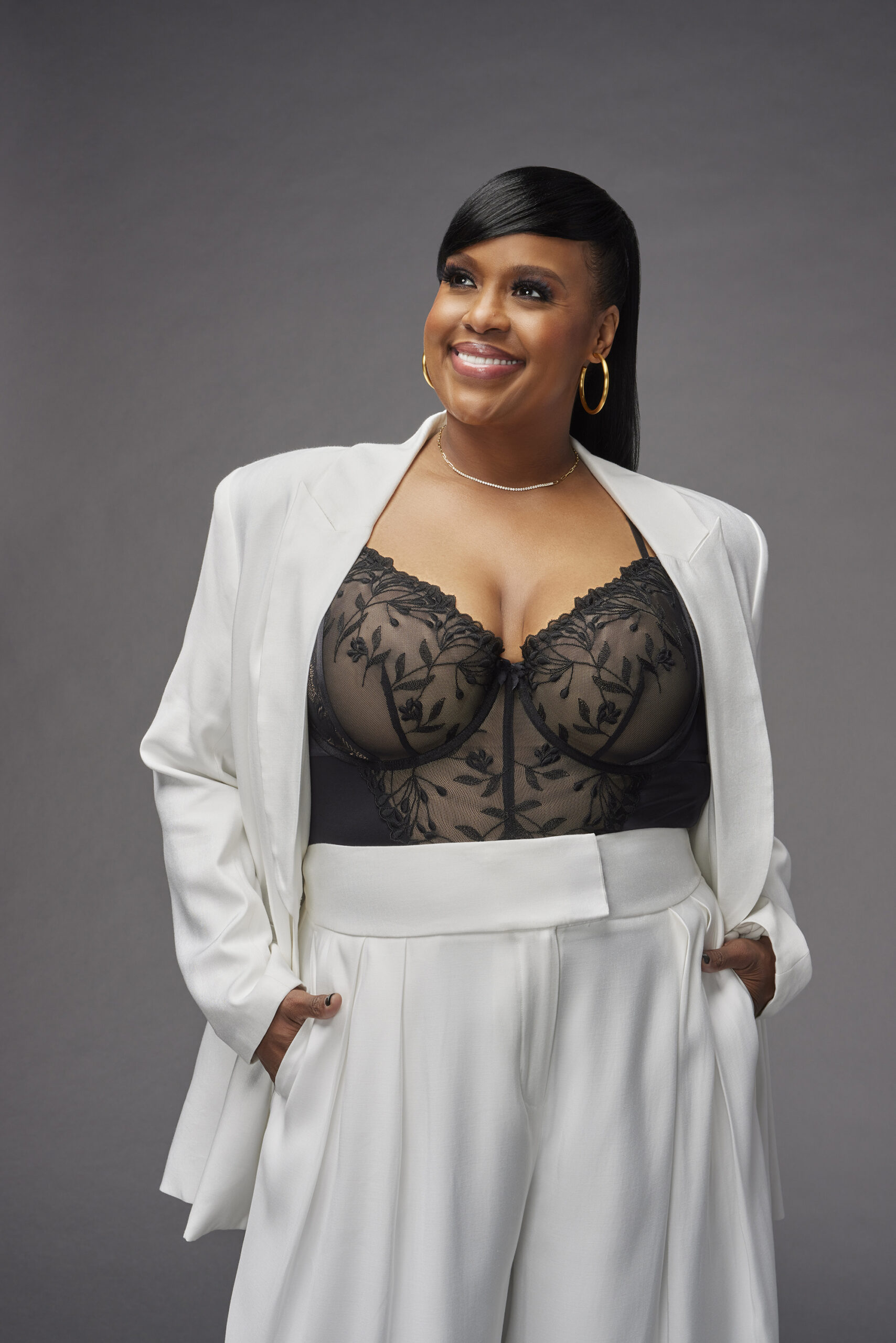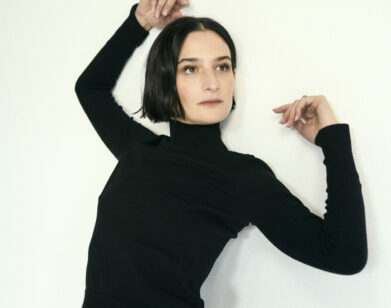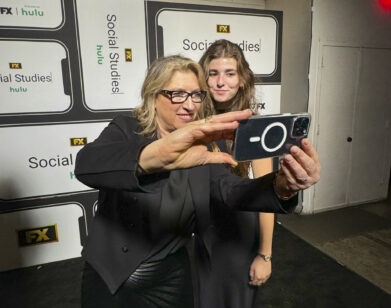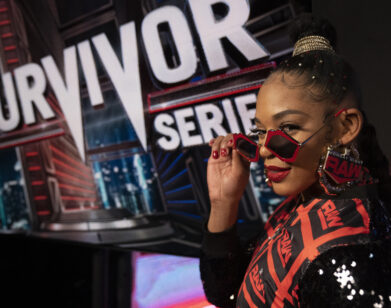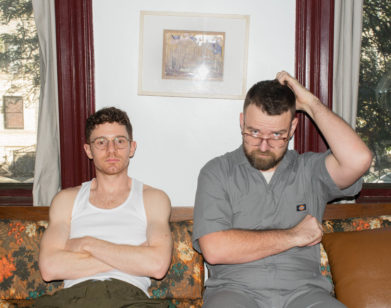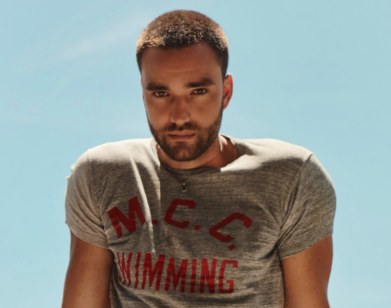WOMEN
“How Does It Feel to Be So Funny?”: Natasha Rothwell, in Conversation With Quinta Brunson
When Natasha Rothwell hopped on a call last month to talk to her good friend Quinta Brunson, her new show How to Die Alone had just dropped on Hulu. “I’m trying to get through this without crying,” she confessed. “Today’s been a day.” It’s not that Rothwell isn’t ready for the spotlight—in fact, she’s stolen it in several roles, from her side-splitting turn in Insecure to her major arc in the first season of The White Lotus. But her long overdue main character moment culminates in the role of Mel, a broke airport employee who’s looking for love. Newly a leading lady herself, Rothwell shares her character’s sense of open-hearted vulnerability (which is no wonder, since Rothwell wrote the series, too). To drink in the moment, she joined her fellow comedian and Philly girl for an impromptu therapy session, during which they explored the existential crises, “fine-ass men,” comedy as a team sport, and the importance of allowing yourself to make mistakes (like a Roomba vacuum cleaner).
———
QUINTA BRUNSON: We are back, baby.
NATASHA ROTHWELL: Oh my goodness. It’s so good to see your face.
BRUNSON: It’s good to see yours too.
ROTHWELL: You’re in the middle of shooting?
BRUNSON: Yes, we are on our hiatus week, but still in the writers room.
ROTHWELL: I can’t wait. I keep refreshing my Hulu. I’m like, “When is the next season dropping?” You got me hooked.
BRUNSON: I’m so happy your show is on Hulu, by the way.
ROTHWELL: Thank you. I texted you last week and I was just like, “How did you do this?” But I don’t even know if a conversation with you would’ve prepared me for this week. I mean, it’s an actual dream come true. You know this.
BRUNSON: It’s wild. You have to just do it, and then you learn as you’re doing what it really takes to make your own show. Did you write the pilot?
ROTHWELL: Yeah, the only thing I didn’t do was direct this season. I did it once for Insecure and I would love to do it again, but there was so much happening that I was like, “Let me just not make it insane.”
BRUNSON: Of course. And let me just say, it’s so good to see you be the lead of a show. You are insanely comedically talented. All of us have known for a really long time that you have what it takes to carry a project. I pulled up the pilot on Hulu and I’m two minutes in, laughing, feeling emotional. So how does it feel? You have to have felt that people wanted this for you for a long time.
ROTHWELL: Yeah, I absolutely felt it, but there’s this abject fear of letting them down. And I definitely have wanted it for myself, but I genuinely love being a part of anything that’s cool. It doesn’t matter the size of the part; I really do enjoy that support work. But it’s definitely something I’ve talked about in therapy: main character energy doesn’t come naturally to me. It’s all about imposter syndrome and worthiness and all of that.
BRUNSON: I feel like it may also come from an improv and sketch background, where you find real value as a part of an ensemble. I felt that way with Abbott [Elementary]. I was not written into Abbott.
ROTHWELL: That’s so real. I love team sports. To me, I love being a part of something. So I feel swing-shot into this moment, but I also know that I have something important to say and I know how much I would’ve valued someone who looked like me in a leading role. I feel the call to do it, and that’s given me the strength to handle all of the wild shit.
BRUNSON: Absolutely. I’m a team sports girl, too. I don’t like the individualism of being on stage by myself, so I made the executive decision to let that go and focus on Abbott, which I do consider a big team sport. Anyway, let’s talk about the fact that you’re making a comedy at the airport. That’s always been a fascinating world to me. Me and Larry Wilmer have talked a lot about trying to break a comedy at the airport. And you’ve done it. Can you tell me what drew you to that profession for this character? I also have some production questions like… how are you shooting in the airport?
ROTHWELL: Logistically, it was a feat. But when I first started developing the show at HBO, one of the first conversations I had out the gate with Amy Gravitt was about my love of characters. I’m a voyeur, I study human behavior—we both do, for a living. Perhaps I’m an anomaly, but I love the airport. People hate it, but I love it. I get there early and it’s just my jam. So when we were thinking about the show, I told her, “I want to play with this psychological projection where I see myself in other people.” I wanted to be in an environment where I wouldn’t be pigeonholed by a specific demographic or a specific kind of person. The airport really is like a microcosm, especially JFK. You get all walks of life. So that space has just come alive for me and provided this endless well of stories.
BRUNSON: Mm-hmm. I love the airport because you are forced to, if not interact, at least share shoulders with all types of people. And I also love when I’m watching something and I feel like I know the world, I know the story, but then a character says something that I haven’t given thought to. Like that one character saying, “We work the airport, we’re invisible to them.” When you give people lives and fleshed out thoughts and feelings, it helps the masses think twice before they overlook them.
ROTHWELL: And you’ve done it so well. My older sister has been in education in Philadelphia for 25 years now. She called me when the show came out like, “This is crazy,” ‘cause she was seeing herself on screen. That’s what your show has done so beautifully and what I hope my show can do.
BRUNSON: That’s really sweet. I’m going to shift gears a little bit. It should not go unnoticed that you’ve racked up spots in today’s hottest shows and movies. If you were a different person, perhaps a white man or a white girl, people wouldn’t shut up about it. But you’ve been in Wonka, Sonic, The White Lotus, consistently shining. I’m curious about your path as an actor. I don’t want to get too in the weeds, but when it comes to projects, are you like, “I want to do those things”? Or are your agents and managers like, “Hey, I see this role for you”?
ROTHWELL: First of all, thank you. I’m like, choking back tears. Today’s been a day, and this is just like you to push me through. [Takes a deep breath] I’ve been very deliberate about the things that I do. And I think it’s a consequence of walking through the world as a plus-sized Black woman. There are a lot of preconceived notions about who I am, what I can and can’t do. So for me, I don’t want to do something that is expected; I want to do something that is good. It doesn’t have to be a “Black role” for me to consider it. And it doesn’t have to be scripted. So I think, over the years, I’ve proven to be an interesting choice, and I feel like that has allowed other decision-makers to bet on me as well. It’s not just subversion for subversion’s sake. They’re roles that I actually like, and while they tend to be marginalized characters, I try to find a way to bring them into the narrative as best I can.
BRUNSON: Totally. I get that feeling of, “You people better be lucky you got her.” Also, we’re both from Philadelphia. How does it feel? Isn’t being from Philadelphia a unique experience?
ROTHWELL: It is. My parents were both born and raised in Philly. My dad was in the Air Force, so I moved around a lot. But Philly was my anchor.
BRUNSON: I remember one time over Christmas, maybe two or three years ago, you sent me a picture. There was nothing unique about the picture other than the fact that I saw it and I was like, “Oh, she’s from Philly. She’s here.”
ROTHWELL: Oh yes, I’m here. I’m in my auntie’s living room. There’s plastic on the couch. The Eagles are about to play, so everybody’s got to shut up. It’s real.
BRUNSON: I felt it. No one else except for other people from Philly know what it means not only to make it out alive, but to come out on top.
ROTHWELL: Like, it’s crazy. My parents aren’t supposed to be here. You know what I mean? It’s that kind of upbringing where you see the resilience in them, and it’s no wonder that we were resilient in our careers, because they survived too much for me to fuck up this opportunity.
BRUNSON: It’s like, all the people who have survived are the exception, not the rule. And then, when you come out of the city, we let some of our defense mechanisms go. ‘Cause you cannot carry all that you come up with from Philly with you, or else that’ll tear you apart once you get here. We still take the good things with us, but try to shed some of the things that we’ve built up to survive the city as well.
ROTHWELL: You have this Philly confidence and sureness about yourself that is enviable. I see the way you walk in your purpose, the way that you own who you are. It’s literally vision board shit for me. I saw a picture from you at Fashion Week. I remember I took a screenshot and sent it to my friend like, “How do I move like this?”.
BRUNSON: Oh, Natasha.
ROTHWELL: There’s something so strong and beautiful that feels uniquely Phill, but it’s also just a quality of yours that I’m obsessed with.
BRUNSON: That’s very kind. It’s funny, because you said how crazy your day was, and today I had to talk to Conan O’Brien and then Ted Danson and now I’m talking to you. And I can think of no better third person for me to talk to today, to have a conversation about comedy and soul. This brings me to the other thing I wanted to talk to you about. How does it feel to be so funny? ‘Cause you just have it. If I was that funny, you couldn’t tell me shit.
ROTHWELL: You are, though. You are.
BRUNSON: Not like you. Sometimes when I watched Insecure, I would choke. Like, choke, choke.
ROTHWELL: Oh my goodness.
BRUNSON: What is most refreshing to me about this show is death being talked openly and humorously in a show about a Black woman. I’ve always really appreciated projects that talk about death as a reality. It happens to all of us. And I’ve gotten to see it in a lot of projects with white leads, white writers. There’s a lot of freedom for them to discuss death. So I wonder, did you think about the impact of talking about death as a Black woman?
ROTHWELL: I wanted to be able to show an existential crisis from my POV. So often, shows about having existential crises and being neurotic aren’t par for the course for Black leads, let alone Black plus-sized leads. So I wrote it out of necessity, because I had that story to tell. I mean, I’ve been in therapy for 20-plus years, I’ve been working on my mental health and reconciling my existence with all of the above, thinking about death and how finite life is. And when you honor death in that way, it allows you to take big swings.
BRUNSON: There’s so much beauty in being like, “Hey, it could be over tomorrow, so what will you have done with today?” I want more Black women to feel the freedom to make mistakes.
ROTHWELL: We use a metaphor in the show about how my character’s like a Roomba vacuum cleaner. A Roomba gets to hit wall after wall after wall, but it’s not a bad thing—it’s information. And so often we don’t show the process of what it is to be an adult and to heal and to grow. Because it’s not about never making mistakes; it’s making the same mistakes over and over again, but making it better. It’s such a privilege to be able to put a show out into the world that allows for that messiness and vulnerability, and I’m so grateful that I have done a substantial amount of work to heal those parts of myself that were living in fear. There’s an irony in putting this out into the world, ‘cause it’s terrifying. So I’m leveling up in therapy; she’s going to get an earful.
BRUNSON: Another wonderful thing that I love in this show is like, boom, 10 minutes in, two love interests. Period. Love it. Turn it up.
ROTHWELL: I took a page out of Issa [Rae’s] playbook: we’ve got some fine-ass men, and they’re so talented. And the love story of the show is like a Trojan horse to have a real conversation. It’s been really cool to play with those rom-com tropes but turn the key a little bit, zig when they think we’re going to zag.
BRUNSON: Look, I know what the rest of the world feels about fat Black women, but my life is filled with fat Black women who have always been loved, who have always had multiple niggas on the side.
ROTHWELL: Period.
BRUNSON: So for me, I’m just seeing a present reality. I’m seeing what has yet to be seen on television.
ROTHWELL: Correct.
BRUNSON: And you’ve done a fantastic job at making this a comedy. Was that hard for you? I guess not, because you’re just funny.
ROTHWELL: It wasn’t hard for me, but it was hard for the studio. Tonally, I had to say it with my chest a couple times because Hollywood thinks in binary terms. It’s like, comedy or drama. And I think they were afraid of the emotional swings, the breadth of the comedy, ‘cause it’s not just one kind of comedy. But luckily, everything that I fought for, I won. When dealing with deep subject matters like death or loneliness, all oppressed people use comedy to cope. So I couldn’t imagine a show about the dark without the light, you know what I mean? I remember cracking up at my grandmother’s funeral in Philly. Some nigga hit me with his Cadillac on my way to the funeral. He came out [of the car] looking like a pimp and I just couldn’t stop laughing. And then I told my mom the story and we’re laughing in the pews. That’s just how we handle dark shit.
BRUNSON: That’s so funny. That reminds me of my uncle’s funeral. Well actually, I can’t tell this story here, but I’m not unfamiliar with death. I come from a big family, so I have learned to approach death with honor, with respect. I understand what it means to get to live a long life and what it means to live a very short one. So let me end it with this: how does this moment feel for you? The show is out today. What are you feeling right now, in general? A blue sky?
ROTHWELL: I’m trying to get through this without crying. I’m overwhelmed by the love and support I’ve received today and right now. I had only dreamed of having a day like this.
BRUNSON: Don’t make me cry.
ROTHWELL: To be in New York on this day, when I just have very acute memories of the struggle here, having my mom order me pizza from Philly in Brooklyn because I didn’t have any money in my account, or collecting cards off the subway floor because I was in between checks and I needed to get back and forth to UCB [Upright Citizen’s Brigade]. It’s a full-circle moment, and I’m just grateful. The weight of that gratitude is just unreal.
BRUNSON: That’s beautiful. Keep walking in that gratitude and know that everyone is so, so happy for you. It is finally Natasha time.
ROTHWELL: It’s Natasha time.
BRUNSON: I’m very proud of you, and not in the corny way. I want you to enjoy this day. This is a beautiful day. I just put the show on my Hulu. You’re going to run them numbers up.
ROTHWELL: Run them numbers, girl.

